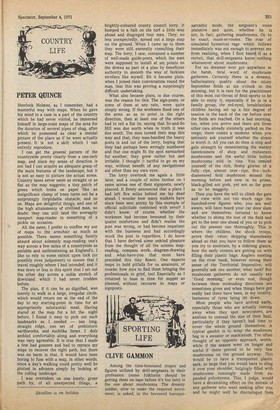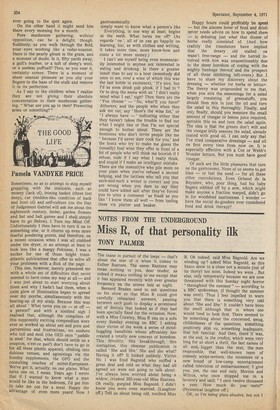PETER QUINCE
Sherlock Holmes, as I remember, had a masterful way with maps. When he gave his mind to a case in a part of the country which he had never visited, he immersed himself in large-scale maps of the area for the duration of several pipes of shag, after which he possessed as clear a mental picture of the place as if he were actually present. It is not a skill which I can entirely reproduce.
I can get the general pattern of the countryside pretty clearly from a one-inch map, and since my sense of direction is not bad I can acquire an adequate grasp of the main features of the landscape; but it is not so easy to picture the actual scene. Country lanes never seem as straight or as flat as the map suggests; a tiny .patch of green which looks on paper like an insignificant clump of trees turns out be a surprisingly forTidable obstacle; and so on. Maps are delightful things, and one of the high attainments of civilised man, no doubt: they can still land the averagely inexpert map-reader in something of a pickle on occasion.
All the same, I prefer to confine my use of maps to the armchair as much as possible. There seems something faintly absurd about solemnly map-reading one's way across a few miles of a countryside as amiable and unthreatening as England's. I like to rely to some extent upon luck (or possibly even judgement) to ensure that I travel roughly where I had intended; and it was more or less in this spirit that I set out the other day across a noble stretch of downland which I had never trodden before.
The plan, if it can be so dignified, was merely to walk in a large, irregular circle, which would return me at the end of the day to my starting-point in time for an appropriately substantial meal. Having stared at the map for a bit the night before, I found it easy to pick out such landmarks as I needed — one long, straight ridge, one set of prehistoric earthworks, and suchlike items. I duly ambled comfortably along and everything was very agreeable. It is true that I made a few bad guesses and had to retrace my steps to recover the right path, but there was no harm in that. It would have been boring to fuss with a map, in other words, since a day's walking could pretty well be plotted in advance simply by looking at the rolling landscape.
I was overtaken on one lonely, grass path by, of all unexpected things, a brightly-coloured county council lorry. It bumped to a halt on the turf a little way ahead and disgorged four men. They, no less unexpectedly, spread out a large map on the ground. When I came up to them they were still earnestly consulting their map. The lorry, I saw, contained a number of well-made guide-posts, which the men were supposed to install at set points on the downs as part of a plan by beneficent authority to smooth the way of feckless strollers like myself. Bit it became plain, when I joined their conversation round the map, that this was proving a surprisingly difficult undertaking.
What also became plain, in due course, was the reason for this. The sign-posts, or some of them at any rate, were quite simply wrong. If the workmen fixed one of the arms so as to point in the right direction, then at least one of the others had to tell a flat lie, saying that So-and-So Hill was due north when in truth it was due south. The men turned their map this way and that; they man-handled the heavy posts in and out of the lorry, hoping that they had perhaps been wrongly numbered and that one might fit the spot earmarked for another; they grew rather hot and irritable. I thought it tactful to go on my way, without benefit of any navigational aid other than my own eyes.
The lorry overtook me again a little later, and a couple of miles farther on I came across one of their signposts, newly planted. It firmly announced that a place I had left five miles behind me lay dead ahead. I wonder how many walkers have since been sent astray by this example of official solicitude combined with error? I didn't know, of course, whether the workmen had become bemused by their quaint misfortune and didn't realise the post was wrong, or had become impatient with the business and had accordingly stuck the post in regardless. I do know that I have derived some unkind pleasure from the thought of all the solemn mapreading, compass work, diagram-drawing and what-have-you that must have preceded this tiny fiasco. One expects maps to hold pitfalls for us amateurs, of course: how nice to find them bringing the professionals to grief, too! Especially as I returned to base in time for supper as planned, without recourse to maps or signposts.
sarcastic mode, the sergeant's voice plaintive and quiet, whether he is not, in fact, gathering mushrooms. Or to be exact, mush-er-rooms. The roar of simulated hysterical rage which follows
immediately was not enough to prevent me from realizing, when I first heard it as a recruit, that drill-sergeants know nothing whatsoever about mushrooms.
For no dreamer ever got anywhere in the harsh, feral word of mushroom gatherers. Certainly there is a dreamy, hallucinatory quality about the misty September fields at six o'clock in the
morning, but it is rare for the practitioner of this most cut-throat of field sports to be able to enjoy it, especially if he is in a family group, the red-eyed, breakfastless children having set up a fair degree of tension in the back of the car before ever the fields are reached. On a bad morning, too, when you arrive and there are three other cars already sinisterly parked on the verge, there comes a moment when you seriously ask yourself whether the strain is worth it. All you can do then is stop and gain strength by remembering the watery tastelessness of shop and restaurant mushrooms and the awful little button mushrooms sold in tins. You remind yourself of the rich, fleshy glories of a fully ripe, almost over ripe, five inch
diametered field mushroom missed the morning before and now in its prime, black-gilled not pink, yet not so far gone as to be maggoty.
Then you have the will to climb the gate and view with not too much rage the
hunched-over figures who, you are well aware, will have heard your car door slam and are themselves tortured to know whether to skimp the rest of the field and get to the next one ahead of you or to pick out the present one thoroughly. This is where the children, the shock troops, prove their value, skipping shamelessly ahead so that you have to follow them as you try to ascertain, by a sidelong glance, how the early corners are getting on with filling their plastic bags. Anglers meeting on the river bank, however strong their sense of the Territorial Imperative, will generally ask one another, what luck? But mushroom gatherers do not usually say Good morning,' or even nod, though between them misleading directions are sometimes given and when things have got really bad there have been, in my locality, instances of tyres being let down. Most people who have arrived early, especially those who are actually coming away when they spot newcomers, are anxious to conceal the size of their haul, particularly if they haven't had time to cover the whole ground themselves. A typical gambit is to wrap the mushroom bag in a sweater or mackintosh. I've often thought of an opposite approach, worth while if the season went on longer and useful if there proved to be very few mushrooms on the ground anyway. This would be to have a transparent plastic sack, so large that you would have to sling it over your shoulder, bulgingly filled with mushrooms cunningly made from expanded polystyrene. This, I judge, would have a devastating effect on the morale of any gatherer who went seeking after you, and he might well be discouraged from ever going to the spot again.
On the other hand it might send him there every morning for a month.
Pure mushroom gathering, without opposition, can be a delight, though. Suddenly, as you walk through the field, your eyes working like a radar-scanner, there is the pearly gleam in the grass, and a moment of doubt. Is it, fifty yards away, a gull's feather, or a tuft of sheep's wool, or a useless puffball? Then, as you near it, certainty comes. There is a moment of sheer sensual pleasure as you slip your fingers to the base of the stalk and remove it in its perfection.
As I say to the children when I realize they are not giving their absolute concentration to their mushroom gathering. "What are you up to then? Presenting arms or something?"



































 Previous page
Previous page